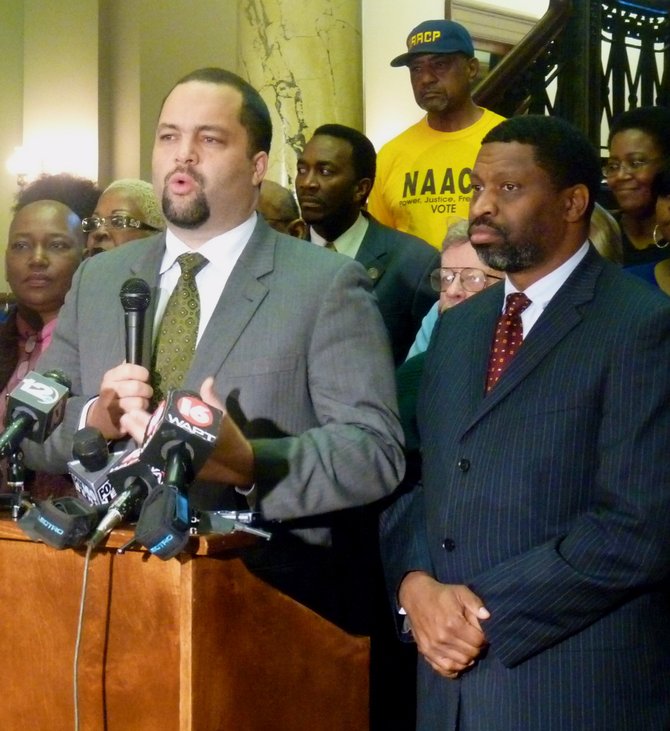The NAACP's Ben Jealous and Derrick Johnson are fighting voter suppression efforts around the nation and in Mississippi. Photo by Ward Schaefer
An NAACP voter-registration campaign launched yesterday will target minorities, students and senior citizens in a dozen swing and southern states where voter identification laws have passed, including Mississippi.
Announcing the voter drive in Atlanta yesterday, NAACP National Director Benjamin Jealous said laws requiring voters to present photo identification prompted the organization to step up efforts to ensure that black turnout in the upcoming Nov. 6 remains robust.
Derrick Johnson, director of the Mississippi state conference of the NAACP, believes a rash of voter-suppression methods emerged in recent years, including voter ID and state regulations on third-party voter registration organizations.
Last year, Florida implemented burdensome new regulations on organizations that register voters including imposing penalties for not submitting the forms within 48 hours and requiring volunteers to sign oaths that threaten jail time for not complying with state election laws. Several groups have challenged the Florida law in federal court.
"When you have new devices being created and implemented as public policy, it calls for the (U.S. Department of Justice) to take a more active approach," Johnson told the Jackson Free Press Wednesday afternoon.
In November, Mississippi joined dozens of other states in adopting a voter ID mandate through a statewide ballot initiative. Civil-rights advocacy groups, including the NAACP, have objected to the requirements, saying the rules hearken back to vote-suppression tactics such as poll taxes and grandfather clauses that were prevalent during the Jim Crow era.
In the recently concluded Mississippi legislative session lawmakers passed the enacting legislation for voter ID, and the subject was often the subject of tense debate. The bill is currently awaiting Gov. Phil Bryant's signature.
Once the governor signs the legislation into law, the federal Justice Department has to ensure that it complies with the 1965 Voting Rights Act's Section 2, which prohibits voter discrimination. Section 5 of the act requires the DOJ to pre-clear changes to certain states' voting laws.
President Barack Obama's administration has blocked similar laws in Texas and South Carolina, prompting observers to speculate that Mississippi's law has a long way to go before it can be implemented.
Yesterday at Tougaloo College Assistant U.S. Attorney General during the John F. Kennedy administration John Doar told an audience that the federal government didn't always keep a watchful eye over voter-suppression tactics.
In his early days at the Justice Department, he dispatched federal prosecutors to places like Mississippi to gather information because the Federal Bureau of Investigations didn't like investigating civil-rights cases, Doar said.
"When the boys were murdered in Neshoba County, the FBI changed," Doar said, referring to the murders of civil-rights workers Andrew Goodman, James Chaney and Michael Schwerner who were trying to register blacks in Mississippi to vote.
The NAACP's Johnson said federal enforcement of the Voting Rights Act has been spotty over the years. "It ebbs and flows depending on who's in office and the values they bring to that office," he said.



Comments
Use the comment form below to begin a discussion about this content.
comments powered by Disqus